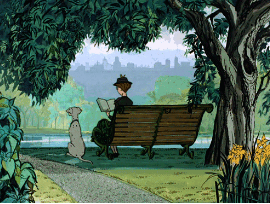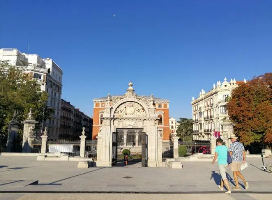To understand the present and the past of western ideas of nature is half of the history of Western thought
6 min read
I have read books by some of America’s first nature lovers who left the city for the uninhabited wilds of the Southwest, where they lived indescribably hard lives and enjoyed indescribably wild beauty. They were one of the main driving forces behind the creation of national parks in the United States, such as Yellowstone, Yosemite, and the Grand Canyon. But I read the book at leisure, read more than half gave away, now the author, the title of the book can not remember.
I’m a city person, but because I’m a city person, I have a special sense of wild beauty. The first time I went to Xinjiang when I was 16 years old, I was caught by the sight of the Gobi desert as the train passed by. Some people interpret this reaction as fear, I don’t know, but people are intimidated when they see it. Kant made the distinction between sublime beauty and beauty, and I think that’s what he meant. The sublime beauty is like the desert and the Gobi desert, and the sky over the Gobi desert, and the sea, and the wind and the rain. They are not “beautiful” in the general sense, but they do have a kind of beauty, and it is not the same as beautiful.
Did man ever live in nature?
If so, the days of the Indians before the Europeans came into America must count. Read Charles Mann’s 1491, which Outlines what America was like before Columbus came. The original book was published in 2005, and the images provided by the author are a synthesis of recent discoveries and research results on related topics from a variety of disciplines, including archaeology, anthropology, and genetic research.
One of the underlying themes of the book is that it’s based on new research showing that pre-Columbian America was much more prosperous than we once thought, that we’d found many, many human remains from places that were thought to be uninhabited, that the old “New World,” with a population that some experts estimate could have been as high as 100 million people, more than the entire population of Europe at the time. Within 130 years of the European visit, 95% of the American population had died.
There are a number of areas that have reached a high level of civilization. The Inca Empire was the largest empire in the world. Even the Amazon stream forest, which has been regarded as the most typical primitive state, is largely the result of Indian participation in the transformation for thousands of years, according to research. Many of the original records made by Westerners in the 16th and 17th centuries were less about Native American life and more about the miserable state of a small group of displaced people devastated by Western germs and violence. For example, “The Stone Age tribesmen of the Amazon are very much a European invention”.
We know bits and pieces of what America was like. For example, we’ve all heard about the sudden extinction of the Mayan civilization. According to this updated picture, much of what we knew was wrong, or at least dubious. Chapter 8, for example, reconstructs the complex struggles and divisions among the Mayan kingdoms, and, “We now know that the decline of the Mayan civilization was not as rapid, dramatic, or widespread as previously believed.” We may still not have the answer to the mystery of the Mayan extinction, but we are looking at such questions in a rather different light.
Conception of nature Nature is also a big subject in philosophical writings. However, philosophy does not describe nature, nor does it write about natural life. The “state of nature” in Hobbes’s and Locke’s works are fabricated for the purpose of constructing theories. Philosophers are interested in the idea of nature. It is recorded that almost all the ancient Greek philosophers wrote books. For the first hundred or two centuries, almost all their major works were entitled “On Nature.” Unfortunately, none of them has been handed down. Aristotle has a Phusis, also on nature, which we translate into Physics, the most important work, but it is a little too difficult for summer.
The so-called Aristotelian physics is not the physics of modern science, but natural philosophy. The argument of natural philosophy is no different from that of the other branches of philosophy or of First Philosophy. Natural philosophy depends on natural concepts, on natural understanding. For natural philosophy to be philosophy, the most important thing is that it uses concepts that must be justified by natural understanding. The concept of nature is full of emotional content, and Aristotle’s Physics contains plenty of emotional content. For example, fire and gas naturally move upward, while water and earth move downward. For more on this, read my book Common Sense of Philosophical Science.
Our concept of “nature” today comes from two sources: one is our own “nature”, the way things are created and spontaneous, “naturally”; The other is a Western concept, nature, whose origins can be traced back to the Latin natura and then to the Greek phusis, as opposed to nomos (” normality “) and techne (” art “), meaning artificial means, They represent human society and nature. Some things in human society are also natural, such as human nature, and some things are man-made, such as laws. The word “nature” is sometimes translated as “nature” and sometimes as “nature”.
I wrote in an old article: “The main trouble in drawing the line between nature and man is on the man side, for in no language will anything man-made be called unnatural. In the eyes of naturalists, test-tube babies and cloned sheep are unnatural. Airplanes and spaceships are unnatural. But to the more thorough naturalist, fruit tree grafting and donkey carts are not natural either. Taken to the extreme, growing crops or walking upright is just as unnatural. Of course, this is not just an argument, but an argument that happens around us every day. Being stuck in traffic for an hour or two with a purse under your arm and sitting at a desk eight hours a day is certainly not the most natural way to live. But who dares to say that, compared with those farmers in Maqiao who work at sunrise and breathe in daily life, the asvagus in the fairy Mansion must have a more natural life? From Rousseau’s naturalism to today’s environmentalism, this question needs to be clarified”.
What the Greeks called phusis, and the Romans called natura, meant something different from what we call nature today, and especially from what we call nature in the natural sciences. Natural science is called natural science, because it does not talk about the soul, spirituality and other factors. Physiology, for example, is a natural science. Physiology also studies people, but it only studies the body, not the mind. In order to study purely physical nature, natural science has created many of its own concepts, which are not connected or even compatible with our natural experience. In this sense, natural science is not very “natural”. It does not deal with things as they are, nor does it rely on our natural experience. So the term “natural science” is a bit misleading.
The Greeks contrasted nature with norms and laws, and now there is an even sharper contrast than then between what is natural and what is technological. Today we live in a world where technology is ubiquitous. Technology has largely suppressed our natural nature, or “transformed” and “covered up” the natural state of life. Modern people are unlikely to have a complete natural life, because we cannot live without relying on technological constructs. Isn’t the use of a fairly obvious technique, including your calls and mine? It’s more natural to meet and talk. While we’re all used to talking through the microphone, it’s not as natural as talking in person.
In short, the concept of nature has undergone many changes since ancient times, and there have been many profound studies on these changes. Among the philosophers I am familiar with, Heidegger is the most famous. Unfortunately, his book is more difficult to read than Aristotle. Whitehead has a book called The Concept of Nature, which is also a bit difficult to read. If I could only recommend one study on this subject, I would recommend Colin Wood’s The Idea of Nature, which is quite plain, with a wide range of knowledge and insight behind it. To understand the present and the past of western ideas of nature is half of the history of Western thought.






